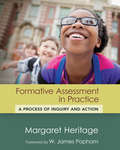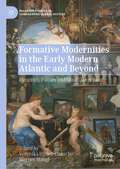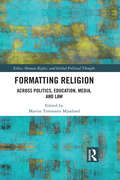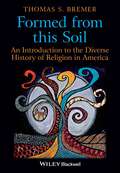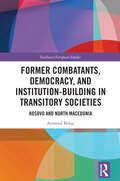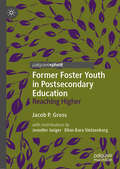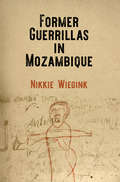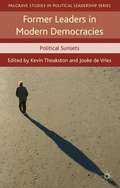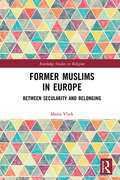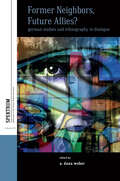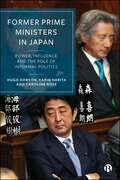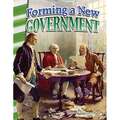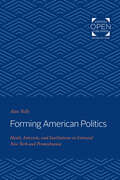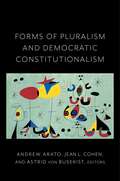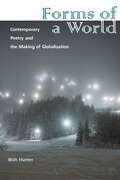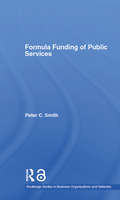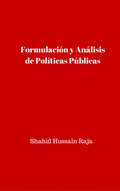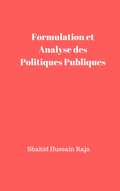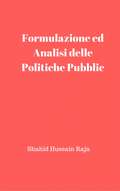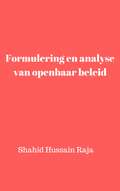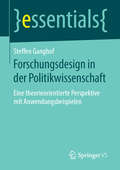- Table View
- List View
Formative Assessment in Practice: A Process of Inquiry and Action (Assessment, Accountability, & Achievement Series)
by Margaret HeritageMargaret Heritage presents a practical guide to formative assessment as a process of &“inquiry and action&” essential to twenty-first century learning. In the wake of the development of the Common Core standards and the effort to develop the appropriate assessments to accompany them, formative assessment has attracted increasing attention from policy makers and practitioners alike. Yet this powerful and promising approach is often applied in ways that fail to capture its potential for improving student learning. In her book, Margaret Heritage presents a practical guide to formative assessment as a process of &“inquiry and action&” essential to twenty-first century learning. Heritage&’s approach is distinctive in that it is grounded in a &“children&’s rights&” framework—that is, the belief that assessment should be in the best interest of all students, that students should be involved in the decisions that ensue from assessment use, and that opportunities to learn, progress, and succeed will be available to all children equally. Accordingly, she addresses the students&’ own role in learning about themselves as learners and examines the classroom as a community of practice. The book also includes chapters on learning progressions and the policy contexts that support formative assessment. Skillfully interweaving theory and practice, this book promises to be an invaluable resource for teachers, teacher educators, and those interested in the academic and policy aspects of assessment.
Formative Modernities in the Early Modern Atlantic and Beyond: Identities, Polities and Glocal Economies (Palgrave Studies in Comparative Global History)
by Werner Stangl Veronika Hyden-HanschoThis book offers a new perspective on the concept of modernity. Since its invention as a contrast to Antiquity or the Middle Ages, modernity has been tied to ideas of superiority, progress, and efficiency. As a counterpart to the Marxist “history of class struggle”, “modernization theories” have transformed modernity into an almost teleological concept of historical development. These strong connotations obstruct a clear look at other forms of modernity. The contributions of the volume will show in a comparative perspective how modernity can also be understood and analyzed as multiple responses of societies and polities to organize themselves in facing ever more complex and integrated interactions at ever larger scales.
Formatting Religion: Across Politics, Education, Media, and Law (Ethics, Human Rights and Global Political Thought)
by Marius Timmann MjaalandTo talk about religion is to talk about politics, identity, terrorism, migration, gender, and a host of other aspects of society. This volume examines and engages with larger debates around religion and proposes a new approach that moves beyond the usual binaries to analyse its role in our societies at large. Formatting Religion delves into these complexities and demonstrates the topical need for better understanding of how religion, society, culture, and law interact and are mutually influenced in periods of transition. It examines how over the last two decades, people and institutions have been grappling with the role of religion in socio-cultural and political conflicts worldwide. Drawing on a host of disciplines – including sociology, philosophy, anthropology, politics, media, law, and theology – the essays in this book analyse how religion is formatted today, and how religion continuously formats society, from above and from below. The volume will be of great interest to scholars and researchers of religious studies, politics, media and culture studies, and sociology.
Formed From This Soil: An Introduction to the Diverse History of Religion in America
by Thomas S. BremerFormed from This Soil offers a complete history of religion in America that centers on the diversity of sacred traditions and practices that have existed in the country from its earliest days. Organized chronologically starting with the earliest Europeans searching for new routes to Asia, through to the global context of post-9/11 America of the 21st century Includes discussion of race, ethnicity, gender, sexual orientation, socio-economic class, political affiliations, and other elements of individual and collective identity Incorporates recent scholarship for a nuanced history that goes beyond simple explanations of America as a Protestant society Discusses diverse beliefs and practices that originated in the Americas as well as those that came from Europe, Asia, and Africa Pedagogical features include numerous visual images; sidebars with specialized topics and interpretive themes; discussion questions for each chapter; a glossary of common terms; and lists of relevant resources to broaden student learning
Former Combatants, Democracy, and Institution-Building in Transitory Societies: Kosovo and North Macedonia (Southeast European Studies)
by Armend BekajThis book explores the long-term impact on democracy and institution-building in post-conflict and transitory societies, stemming from the political integration of former combatants of intra-state armed groups. By providing a comparative analysis on two countries with certain commonalities but also sufficient differences to warrant an intriguing comparison – Kosovo and North Macedonia – the author undertakes an examination of their respective political trajectories with a focus on the role of combatants turned politicians. Revolving around the concepts of democracy and political inclusion versus clientelism, corruption, and institutional capture, the objective is to shed light on the correlation between the inclusion of former combatants in politics, democratisation and institution-building, and the perpetuation of clientelist behavior and other illicit phenomena. In so doing, the book explores the novel concept of democracy spoilers in transitory societies. This volume will be of interest to scholars and students of democracy, nation-building, institution-building, and security studies.
Former Foster Youth in Postsecondary Education: Reaching Higher
by Jacob P. GrossThis book examines the attainment gap between foster youth and their peers. Specifically focusing on post-secondary access and success for foster youth, Gross points out the challenges foster youth face in the primary and secondary school context, such as being less likely to complete high school. These barriers to former foster youth continue once enrolled in post-secondary education, and can manifest as lack of institutional support, financial barriers, and limited to no familial support. The author discusses what policy makers and practitioners need to know to better support the educational attainment of former foster youth.
Former Guerrillas in Mozambique (The Ethnography of Political Violence)
by Nikkie WieginkA sensitive ethnography of former Mozambican National Resistance (RENAMO) combatantsAfter sixteen years of civil war (1976—1992) between the Mozambican National Resistance (RENAMO) and the government of Mozambique, over 90,000 former combatants were disarmed and demobilized by a United Nations-led program. Former combatants were to find their ways as civilians again, assisted by community-based reintegration rituals. While the process was often presented as a success story of peace, renewed armed conflict involving RENAMO combatants in 2013 and onward suggests that the reintegration of former guerrillas was a far more complex story.In Former Guerrillas in Mozambique, Nikkie Wiegink describes the trajectories of former RENAMO combatants in Maringue, a rural district in central Mozambique. Rather than focus on violence, trauma, and the reacceptance of these ex-combatants by the community, Wiegink emphasizes the ways in which RENAMO veterans have navigated unstable and sometimes dangerous social and political environments during and after the war. She examines the experiences of both male and female war veterans and their attempts at securing a tolerable life.Based on fourteen months of fieldwork conducted long after the war ended, Former Guerrillas in Mozambique offers a critique of a notion of reintegration that assumes that the lives of former combatants are shaped first by a break with society when joining the armed group and later by a break with the past when demobilizing and a return to a status quo. Wiegink argues, instead, that former combatants' motivations, experiences, and interactions are not necessarily characterized by a rigid separation from their RENAMO past, but rather comprise a mixture of ruptures and continuities of relationships and networks, including families, the spiritual world, fellow former combatants, political parties, and the state.
Former Leaders in Modern Democracies
by Kevin Theakston Jouke De VriesWhat comes next for a former leader in a democracy - a Prime Minister or President obliged to leave office because they have lost an election, come to the end of their constitutionally-fixed term, lost the backing of their party, or chosen to leave? This book analyses the role and political influence of former leaders in Western democratic states.
Former Muslims in Europe: Between Secularity and Belonging (Routledge Studies in Religion)
by Maria VliekWithin contemporary Western European academic, media, and socio-political spheres, Muslims are predominantly seen through the lens of increased religiosity. This religiosity is often seen as problematic, especially in the context of securitised discourses of Islamist terrorism. Yet, there are clear indications that a growing number of people who grew up in Muslim families no longer subscribe to Islam or call themselves religious at all. Drawing on fieldwork in the UK and the Netherlands, this study examines the experiences of people moving out of Islam. It rigorously questions the antagonistic nature of the debate between ‘the religious’ and ‘the secular’, or who is in and who is out, and argues for recognition of the ambiguity that most of us live in. Revealing many complex forms of moving out, this study adds much-needed nuance to understandings of secularity and Muslim identities in Europe.
Former Neighbors, Future Allies?: German Studies and Ethnography in Dialogue (Spektrum: Publications of the German Studies Association #28)
by Dana WeberGerman studies scholars from various disciplines often use and reference ethnography, yet do not often present ethnography as a core methodology and research approach. Former Neighbors, Future Allies? emphasizes how German studies engages in methods and theories of ethnography. Through a variety of topics and from multiple perspectives including literature, folklore, history, sociology, and anthropology, this volume draws attention to how ethnography bridges transdisciplinary and international research in German studies.
Former Prime Ministers in Japan: Power, Influence and the Role of Informal Politics
by Caroline Rose Hugo Dobson Karin NaritaAvailable open access digitally under CC-BY-NC-ND licence. Despite growing international interest in the position and power of the Japanese prime minister, there is little existing research on what happens after these figures leave office. Examining both pre-war and post-war Japan, this book investigates what Japanese prime ministers have done after stepping down and what influence they have continued to exert. Based on research in English and Japanese including biographies, memoirs and interviews, the book examines the specific activities former prime ministers engage in, assessing their motivations and the effect of informal politics in Japan on their successes and failures. Ultimately, the book answers the simple but often unanswered question of ‘where are they now’ and writes the unwritten post-resignation biographies of Japan’s prime ministers.
Former Yugoslav Republic of Macedonia: Report on Observance of Standards and Codes--Fiscal Transparency Module
by International Monetary FundA report from the International Monetary Fund.
Forming A New Government (Social Studies: Informational Text Series)
by Stephanie ParisThe Primary Source Readers series will ignite students' interest in history through the use of intriguing primary sources. Students will learn about the vital period of American history following the colonies' decision to establish a new government, and covers crucial topics like the Constitution of the United States and the Bill of Rights. This nonfiction reader features purposefully leveled text to increase comprehension for different learner types. Text features include captions, a glossary, and an index to help build academic vocabulary and increase reading comprehension and literacy. This book prepares students for college and career readiness and aligns with state standards including NCSS/C3, McREL, and WIDA/TESOL.
Forming American Politics: Ideals, Interests, and Institutions in Colonial New York and Pennsylvania
by Alan TullyOriginally published in 1994. In this pathbreaking book Alan Tully offers an unprecedented comparative study of colonial political life and a rethinking of the foundations of American political culture. Tully chooses for his comparison the two colonies that arguably had the most profound impact on American political history—New York and Pennsylvania, the rich and varied colonies at the geographical and ideological center of British colonial America.Fundamental to the book is Tully's argument that out of Anglo-American influences and the cumulative character of each colonial experience, New York and Pennsylvania developed their own distinctive but complementary characteristics. In making this case Tully enters—from a new perspective—the prominent argument between the "classical republican" and "liberal" views of early American public thought. He contends that the radical Whig element of classical republicanism was far less influential than historians have believed and that the political experience of New York and Pennsylvania led to their role as innovators of liberal political concepts and discourse. In a conclusion that pursues his insights into the revolutionary and early republican years, Tully underlines a paradox in American political development: not only were the pathbreaking liberal politicians of New York and Pennsylvania the least inclined towards revolutionary fervor, but their political language and concepts—integral to an emerging liberal democratic order—were rooted in oligarchical political practice."A momentous contribution to the burgeoning literature on the middle Atlantic region, and to the vexed question of whether it constitutes a coherent cultural configuration. Tully argues persuasively that it does, and his arguments will have to be reckoned with like few that have gone before, even as he develops an array of differences between the two colonies more subtle and penetrating than any of his predecessors has ever put forth."—Michael Zuckerman, University of Pennsylvania.
Forming a Culture of Peace
by Karina V. KorostelinaThis book challenges the discourses, narrative frames, and systems of beliefs that support and promote violence and conflict, it defines new comprehensive approaches to human security as preventative and empowering to individuals, and it provides conceptual frameworks and methodological tools for enhancing the processes of communicating peace.
Forms of Dominance: On the Architecture and Urbanism of the Colonial Enterprise (Routledge Library Editions: Ethnoscapes)
by Nezar AlSayyadOriginally published in 1992, as part of the Ethnoscapes: Current Challenges in the Environmental Social Sciences series, reissued now with a new series introduction and new preface, Forms of Dominance: On the Architecture and Urbanism of the Colonial Enterprise examines the complex experience of colonial domination, social reaction, and physical adaptation within the built environment of regions such as Morocco, Eastern Europe, India, Guatemala and East Africa, and provides a multi-disciplinary and cross-cultural perspective on the colonial experience.
Forms of Pluralism and Democratic Constitutionalism (Religion, Culture And Public Life Ser. #3)
by Christophe Jaffrelot Nadia Urbinati Alfred Stepan Yüksel Sezgin Frederick Cooper Patrick Macklem Courtney Jung Emmanuelle Saada Katharina Pistor Gary Wilder Joshua Simon Tsilly Dagan Rob Howse Michael Karayanni Jeff MileyThe achievements of the democratic constitutional order have long been associated with the sovereign nation-state. Civic nationalist assumptions hold that social solidarity and social plurality are compatible, offering a path to guarantees of individual rights, social justice, and tolerance for minority voices. Yet today, challenges to the liberal-democratic sovereign nation-state are proliferating on all levels, from multinational corporations and international institutions to populist nationalisms and revanchist ethnic and religious movements. Many critics see the nation-state itself as a tool of racial and economic exclusion and repression. What other options are available for managing pluralism, fostering self-government, furthering social justice, and defending equality?In this interdisciplinary volume, a group of prominent international scholars considers alternative political formations to the nation-state and their ability to preserve and expand the achievements of democratic constitutionalism in the twenty-first century. The book considers four different principles of organization—federation, subsidiarity, status group legal pluralism, and transnational corporate autonomy—contrasts them with the unitary and centralized nation-state, and inquires into their capacity to deal with deep societal differences. In essays that examine empire, indigenous struggles, corporate institutions, forms of federalism, and the complexities of political secularism, anthropologists, historians, legal scholars, political scientists, and sociologists remind us that the sovereign nation-state is not inevitable and that multinational and federal states need not privilege a particular group. Forms of Pluralism and Democratic Constitutionalism helps us answer the crucial question of whether any of the alternatives might be better suited to core democratic principles.
Forms of a World: Contemporary Poetry and the Making of Globalization
by Walt HunterWhat happens when we think of poetry as a global literary form, while also thinking the global in poetic terms? Forms of a World shows how the innovations of contemporary poetics have been forged through the transformations of globalization across five decades. Sensing the changes wrought by neoliberalism before they are made fully present, poets from around the world have creatively intervened in global processes by remaking poetry’s formal repertoire. In experimental reinventions of the ballad, the prospect poem, and the ode, Hunter excavates a new, globalized interpretation of the ethical and political relevance of forms. Forms of a World contends that poetry’s role is not only to make visible thematically the violence of global dispossessions, but to renew performatively the missing conditions for intervening within these processes. Poetic acts—the rhetoric of possessing, belonging, exhorting, and prospecting—address contemporary conditions that render social life ever more precarious. Examining an eclectic group of Anglophone poets, from Seamus Heaney and Claudia Rankine to Natasha Trethewey and Kofi Awoonor, Hunter elaborates the range of ways that contemporary poets exhort us to imagine forms of social life and enable political intervention unique to but beyond the horizon of the contemporary global situation.
Formula Funding of Public Services (Routledge Studies in Business Organizations and Networks)
by Peter C. SmithThe use of formulae has become widespread in recent years across most developed countries. In the UK, a conservative estimate is that annually £150 billion of public service expenditure is distributed using formulae, in services such as health care, local government, social security and higher education. This book offers a comprehensive introduction to the theory and practice underlying the use of such formulae as a basis for funding public services. The philosophy, design and economic consequences of funding formulae have become key policy issues worldwide. However, till now, there has been no text which brings together the economic, statistical and political issues underlying formula funding. This key book fills that gap. Written by a leading international expert on the design of funding formulae, this important book includes empirical evidence from a range of countries and will be a valuable resource for all those involved in this field.
Formulación y Análisis de Políticas Públicas
by Shahid Hussain Raja José Pedro Galindo MacíasDurante los últimos años, los estudios de políticas públicas han estado recibiendo mucha atención en los círculos académicos de todo el mundo por diversas razones. Además de la creciente conciencia sobre el papel y la importancia de la formulación y la implementación de políticas públicas en la lucha contra los desafíos multifacéticos que enfrenta cada país, la razón principal de este interés en cuestiones de política pública ha sido el papel cada vez más firme de las organizaciones de la sociedad civil y los medios masivos de información. Desean saber la forma en que se formulan las políticas públicas que afectan a un hombre común y la forma en que funciona el aparato de gobierno, con el fin de que puedan tomar decisiones informadas y las acciones apropiadas. La formulación de políticas públicas ha ido un cambio metamórfico durante las últimas tres o cuatro décadas, debido al rápido proceso de globalización del mundo. Existen por lo menos cuatro formas en que la globalización está afectando la formulación de políticas en cada país. En primer lugar, gracias a los medios sociales y electrónicos, los pequeños problemas que hace aproximadamente una década sólo podían encontrar lugar en la última página de un periódico nacional, se vuelven noticias de última hora en los principales canales mundiales, creando movimientos de apoyo y solidaridad en diferentes partes del mundo. En segundo lugar, con el mundo que se globaliza rápidamente, los problemas mundiales tales como la degradación ambiental, el cambio climático, los alimentos modificados genéticamente, etc., que sólo se abordan en los pasillos del poder, se están debatiendo en los salones de los países y se están creando fuertes movimientos de apoyo entre la población. En tercer lugar, los centros de poder real y de toma de decisiones están cambiando de un nivel local a un nivel global, teniendo el alcance de los grupos de interés internos con su
Formulation et Analyse des Politiques Publiques
by Shahid Hussain RajaQu’est-ce qu’une politique publique, pourquoi et comment sont-elles formulées et quelles sont les caractéristiques d’une bonne politique publique? Cet ouvrage définit ce qu’est une politique publique et en décrit les différentes caractéristiques. Il énumère les étapes et les procédures adoptées en matière de formulation d’une politique publique dans un pays. Il explique ensuite les caractéristiques d’une bonne politique publique et s’achève par l’examen du processus des politiques publiques dans un pays en voie de développement comme le Pakistan.
Formulazione ed Analisi delle Politiche Pubbliche
by Shahid Hussain Raja Loris PalmitestaDefinisce cos'è un Politica Pubblica nelle sue varie caratteristiche. Definisce i passaggi necessari e le procedure adottate nella formulazione di una politica pubblica in una nazione. In seguito spiega le caratteristiche di una buona politica pubblica termine con un esame del processo delle politiche pubbliche in un paese in via di sviluppo come il Pakistan.
Formulering en analyse van openbaar beleid
by Shahid Hussain RajaGedurende de afgelopen jaren heeft openbaar beleid over de hele wereld om diverse redenen veel aandacht in de academische kringen gekregen. Naast het tonemende bewustzijn over de rol en het aanpakken van de veelzijdige uitdagingen waarmee elk land geconfronteerd wordt, is de belangrikste reden voor deze interesse in openbare beleidskwesties de steeds assertievere rol van de maatschappelijke organisaties en de media. Ze willen weten hoe openbaar beleid dat een gewone man raakt, geformuleerd wordt en de manier waarop het bestuursapparaat werkt, zodat ze ingelichte oordelen kunnen maken en ingelichte maatregelen kunnen nemen. De formulering van het openbaar beleid heeft de afgelopen drie of vier decennia een metamorfe verandering onderggan als gevolg van de snel globaliserende wereld. Er zijn minstens vier manieren waarop globalisering de beleidsformulering in elk land beïnvloedt. Ten eerste, dankzij sociale en elektronische media, worden kleine problemen die een decennium of zo geleden alleen op de achterpagina van een nationale krant geplaatst konden worden, breaking news op de belangrijkste wereldwijde kanalen, waardoor belangbehartiging en sympathie bewegingen in verschillende delen van de wereld ontstonden. Ten tweede, met de snel globaliserende wereld, worden mondiale kwesties zoals aantasting van het milieu, klimaatverandering, GMO, enz., die alleen in de wandelgangen van de macht besproken worden, in de salons van landen besproken en sterke belangbehartigingingsbewegingen onder de bevolking scheppen. Ten derde, verschuiven de centra van feitelijke macht en besluitvorming van lokaal naar mondiaal niveau met het bereik van binnenlandse belangengroepen naar hun sympathisanten in internationale organisaties, multinationals en die in de regeringen van mondiale mogendheden. Deze outreach stelt hen in staat hun eigen regering te dwingen om aan hun eisen te voldoen vanwege de economishe en politieke invload van de mondiale spelers.
Formulierung und Analyse Öffentlicher Vorschriften
by Shahid Hussain RajaDefiniert den Begriff der öffentlichen Ordnung und beschreibt ihre verschiedenen Facetten, listet die Schritte und Verfahren auf, die zur Formulierung einer öffentlichen Ordnung in einem Land erforderlich sind, erklärt die Merkmale einer guten öffentlichen Ordnung und endet mit der Untersuchung des Prozesses der öffentlichen Ordnung in einem Entwicklungsland wie Pakistan.
Forschungsdesign in der Politikwissenschaft: Eine Theorieorientierte Perspektive Mit Anwendungsbeispielen (Essentials)
by Steffen GanghofDas essential unterscheidet drei grundlegende Typen sozialwissenschaftlicher Forschungsdesigns: x-zentriert, y-zentriert und kontrastiv. Diese unterscheiden sich durch die Anzahl der betrachteten Theorien und dadurch, ob diese Theorien logisch konkurrierend oder komplementär sind. Keines der drei Designs ist den anderen eindeutig überlegen, da sie unterschiedliche Annahmen treffen und unterschiedliche Zielsetzungen verfolgen. Sie können sich deshalb sinnvoll ergänzen, auch innerhalb einzelner Studien, wenn dabei bestimmte Fallstricke beachtet werden. Das essential diskutiert die drei Designs anhand von 14 qualitativen und quantitativen Beispielstudien aus der Politikwissenschaft und den internationalen Beziehungen.
